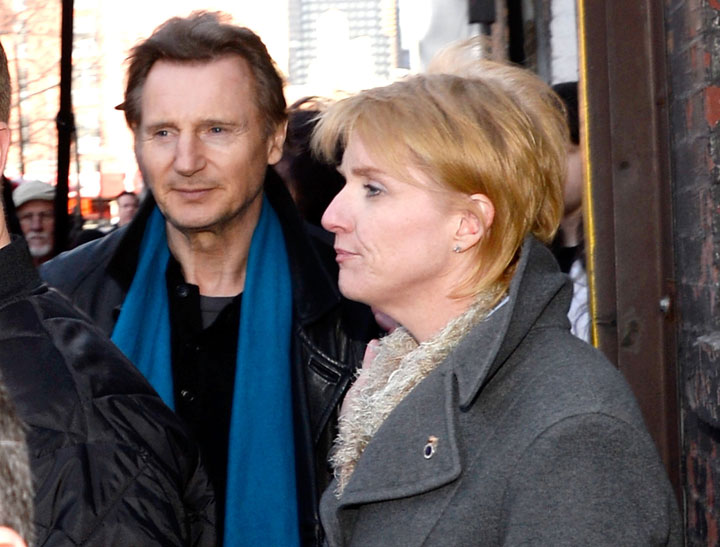TORONTO — Actor Liam Neeson has amped up his efforts to preserve horse-drawn carriages in New York City — a popular tourist attraction opposed by stars like P!nk, Alec Baldwin and Miley Cyrus.

The city’s mayor Bill de Blasio has pledged to shut down an industry he has called inhumane.
“Horses have been pulling from the beginning of time. It is what they have been bred to do,” Neeson wrote in an op-ed published this week in The New York Times.
Neeson is all for the horse-drawn carriages — also known as hansom cabs — that carry people along New York City streets and through Central Park.
For months, he has backed the roughly 300 drivers and stable workers who will lose their jobs if horse-drawn carriages are banned.
“A majority of carriage drivers and stable hands are recent immigrants, often raised on farms in their home countries,” Neeson wrote. “They love their jobs and their horses, and they take pride in being ambassadors for this great city.”
The 61-year-old actor is one of the only celebrities speaking out in favour of the carriages.
In a blog for People for the Ethical Treatment of Animals (PETA), singer P!nk said it was upsetting to see “a horse dodge traffic — nose to tailpipe and spooked by horns, sirens, and pounding music.”
- 2026 Oscar nominations: ‘Sinners’ makes Academy Awards history with 16 nods
- ‘Heated Rivalry’ stars Hudson Williams and Connor Storrie to be torchbearers for Winter Olympics
- James Cameron says he moved from U.S. to New Zealand for ‘sanity’
- Firerose accuses ex-husband Billy Ray Cyrus of abuse, posts alleged audio
She said the horses working in New York City lead “miserable, solitary life, forced to navigate through midtown traffic in all weather extremes pulling heavy loads of tourists.”
In 2012, Oscar-winner Adrien Brody appealed to New York councillors to ban the carriages.
“A horse and carriage belong on a deserted country road or in a small village, not in a big city filled with blaring noise, throngs of people, air pollution, and fleets of taxis — where accidents are inevitable,” he wrote.
In his op-ed this week, Neeson claimed the carriages have made an estimated 6 million trips over the last three decades and “in that time, just four horses have been killed as a result of collisions with motor vehicles.”
In a video to support PETA, Glee star Lea Michele expressed her opposition.

Get breaking National news
“Imagine for a moment that you’re forced to do hard physical labour all day, seven days a week — whether it’s sweltering hot or freezing cold outside. At the end of the day, instead of relaxing on an easy chair or sleeping in a comfortable bed, you are locked in a tiny closet all night long,” Michele said.
“That’s what’s it’s like for horses who are forced to pull carriages in New York City.”
Actor Alec Baldwin has opposed the horse-drawn carriages for decades. In an episode of 30 Rock, his character described them as “rolling torture wagons for nature’s most dignified creature.”
Dan Mathews, senior vice president of PETA, told Global News his organization is mostly focused on New York City’s carriage industry but is also working with opponents of the practice in Chicago, Las Vegas and Salt Lake City.
Mathews pointed out major cities like London and Paris have done away with horse-drawn carriages and Rome recently banned them on weekdays.
“Many cities find that huge, easily skittish animals and big city traffic are hazardous to people and animals and unsanitary,” he said.
Toronto banned horse-drawn carriages in its downtown core in 1998 but Montreal and Victoria continue to offer rides on city streets.
Alanna Devine, director of animal advocacy at the Montreal Society for the Prevention of Cruelty to Animals (SPCA), said her organization is closely watching what happens in New York City.
Devine is quick to dismiss Liam Neeson’s assertions that the horse-drawn carriages are a “signature element of New York’s culture and history” and “there’s no reason an industry that has worked well for the last 150 years shouldn’t continue for another 150.”
“Just because something has been done for a long time doesn’t make it right,” Devine told Global News. “Conditions in the city 100 years ago were very different. There were no cars, no exhaust and noise.”
Montreal has far fewer carriages — known as calèches — than New York and there are bylaws in place regulating everything from working hours to the size of stable stalls.
But Devine said the bylaws are rarely enforced. The Montreal SPCA fields a number of complaints each summer from the general public about the condition of horses.
“People tend to be outraged,” she said. “It gives a poor image to our city. People are embarrassed.”
Devine said Montreal’s new council has talked about strengthening bylaws regulating the industry — but she said it’s not enough.
“Issues inherent with having horses in the city won’t be addressed,” she said. “We’d like to see a phase-out.”
The Humane Society International/Canada is on board.
“It is clear that cities and urban areas are dangerous and stressful conditions for horses to work and live in,” said Ewa Demianowicz.
“Incidents involving horse-drawn carriages throughout the years have resulted in carriage horses dying in the streets, serious injuries to people and property damage, proving that horse-drawn carriages are not only dangerous for horses, but also for people.”
In his New York Times op-ed, Liam Neeson said horses in New York are well cared-for and protected by strict regulations.
“It has been my experience, always, that horses, much like humans are at their happiest and healthiest when working,” he wrote.
Neeson urged all sides in the debate to come together to find compromises and solutions.
“There is no discussion. No referee. Just unjustified accusations, made in a vacuum where one will win and another will lose.”








Comments